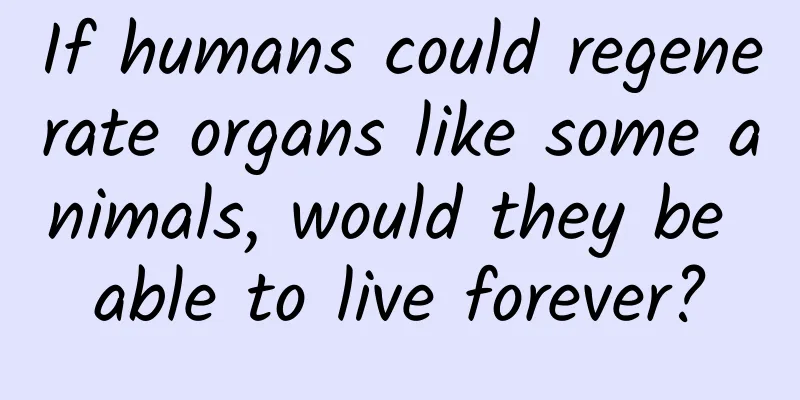If humans could regenerate organs like some animals, would they be able to live forever?

|
No matter who you are, whether you are poor or rich, whether you have made outstanding achievements or are mediocre, you will inevitably grow old and die in the end. This is not a big deal for other animals. Although survival is the first priority for all living things, other animals do not think about it because they lack self-awareness. However, it is different for humans. Some surveys show that most people can realize the true face of death before the age of 10 and begin to worry about it. Therefore, whether in ancient times or modern times, immortality is the ultimate dream pursued by humans. So can immortality be achieved? Death begins with aging, and the aging of the entire body is the accumulation of the gradual aging of various tissues and organs. From this point of view, reversing aging seems to be the key to curbing death. "Reversing aging" sounds too fantastical, so if aging is irreversible, is there any other way? Yes, that is to regenerate tissues and organs. This may sound like an unlikely thing, but it is actually possible. In nature, many organisms have the ability to regenerate tissues and organs, such as hydra. If any part of its body is cut off, it is possible to regenerate a new hydra. Of course, the body regeneration ability of animals cannot be directly transferred to humans. Although there are some organisms in nature that have the ability to regenerate, they all have one common characteristic, which is their simple structure. Take hydra as an example. It does not have any real "organs" in its body, so its body is made up entirely of stem cells, which can continuously divide and create new cells. When cells age or become damaged, they can directly eliminate these cells and create new cells to fill the original positions. However, this set of "Kung Fu" does not apply to complex life forms. Why? Because complex life forms require a large number of different differentiated cells to perform different functions. The liver needs highly specialized liver cells to realize its functions, and the kidneys need highly specialized kidney cells to realize their functions. In order for these cells to have corresponding functions, their ability to divide must be sacrificed, so the human body's tissues and organs cannot regenerate indefinitely. Is there really no way out? Not really. In 2006, Shinya Yamanaka won the Nobel Prize for discovering the secret of cell "rejuvenation". This life scientist found that induced pluripotent stem cells can induce differentiated somatic cells to differentiate into various human tissue and organ cells. This discovery laid a theoretical foundation for the regeneration of human tissues and organs. So specifically, how can we regenerate tissues and organs? There are many methods, such as stimulating the proliferation and differentiation of existing stem cells through specific methods, or introducing exogenous stem cells or progenitor cells. For example, if there is a problem with the human liver, transcription factors can be used to induce liver cells to differentiate again, thereby regenerating liver tissue to repair the original damage. This is not just a theory. In fact, similar technologies have entered clinical trials, such as the technology for making functional human insulin-secreting cells. Human tissues and organs can regenerate. Does this mean immortality is possible? It's not that simple. Although human tissue and organ regeneration technology has broad prospects, there are also safety issues. For example, some contaminated undifferentiated cells may remain in the process, and these remaining undifferentiated cells may bring tumor risks. In addition, we always describe the human body as a machine, but there is actually an essential difference between the human body and the machine. The machine can be replaced wherever it is broken, but can the human body really do the same? In fact, it cannot, because the human body is a whole, and there are many secrets in it that we do not know yet. Even if we replace all the problematic organs, it does not mean that we can prevent the body from aging and death. |
<<: Chinese and Japanese tea culture: Both find the other side incredible
>>: Popular Science Illustration | Do astronauts’ extravehicular activities also require “windows”?
Recommend
49-inch LG original IPS Coocaa K49 new product unboxing review
Recently, Coocaa, an Internet TV brand under Skyw...
Storm Technology is losing its luster and its future is uncertain: the effect of patch-like layout is unknown
Layout, upgrade, expansion... Baofeng Technology ...
Holiday syndrome is not a disease, but it is really fatal when it occurs? Here is the reason →
The Spring Festival holiday is like a balloon, &q...
The latest regulations on entering and leaving Beijing in April: If there is a case within 14 days, can I not enter Beijing? Attached is the latest official news for 2022!
On April 6, 2022, the Beijing COVID-19 Prevention ...
Often feel weak and listless? Maybe you are not eating right...
This article was reviewed by Pa Li Ze, chief phys...
How to safely exit multiple Activities on Android
When making Android Apps, almost every App has a ...
Popular Science Illustrations | One Picture Reveals the Key Technologies Behind Express Delivery
...
Getting started with information flow advertising: How can novices establish a correct data analysis logic system?
How to play information flow advertising ? Who sh...
Puning SEO Training: What methods are commonly used in SEO optimization? In what fields can it be applied?
Most SEOs are based on websites. So the SEO promo...
Yahoo and Google have both withdrawn from China, so how can Amazon be the survivor?
Foreign Internet giants that enter the Chinese ma...
How can back-end developers feel? Salaries of front-end programmers exposed
Recently, a programmer who has worked in the back...
How to use Xiaohongshu for promotion and marketing?
Xiaohongshu is very popular now, and major beauty...
The 10 worst unicorns of 2015: Evernote and Dropbox are on the list
American technology blog VentureBeat wrote an art...
Analysis of advertising placement in the education industry
Due to the impact of delayed resumption of work, ...
Su Yinhua's "Thinking Business School·2019 Business Thinking" (140 episodes) video
Su Yinhua's "Thinking Business School · ...


![[Case] How did Tmall’s 618 Fans Carnival get fans excited step by step?](/upload/images/67cc18cfd630a.webp)






![[Smart Farmers] Awakening the "sleeping" saline-alkali land: These crops can also thrive in saline-alkali land](/upload/images/67f224fb70eca.webp)